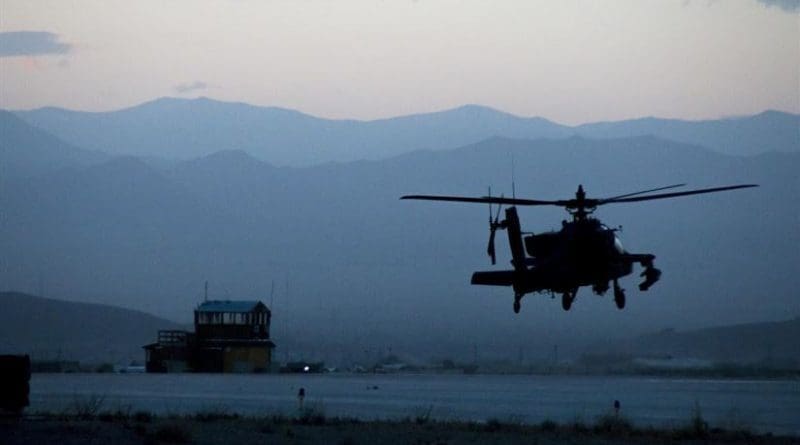Is China Orchestrating Afghanistan’s Future Through Its Proxies? – Analysis
By Lt Gen Prakash Katoch (retd)*
Spying is in the veins of China’s Communist Party (CCP) which runs a global spy network to further China’s geostrategic, economic, scientific, and technical interests. This is more than evident with the recent data leak about some two million CCP members allegedly “embedded” in the biggest companies of the world, including banks, defense contractors, and pharmaceutical companies.
The CCP has also been using terrorism against India, Afghanistan, and Myanmar – sponsoring it itself or through proxies. But the busting of a Chinese 10-member spy-cum-terror capsule in Kabul is unique in that it combines both specialties.
Chinese ‘spy-cum-terror capsule’
This Chinese spy-cum-terror group was running with the help of Pakistan’s Inter-Services Intelligence (ISI), which is hardly surprising. Caught and detained by Afghanistan’s National Directorate of Security (NDS) on December 10, members of this group were reportedly in touch with the Haqqani Network and were gathering information about Al Qaeda, Taliban, and Uighurs in Kunar and Badakhshan provinces.
This may just be the line given to these CCP spies in case of capture because the same information would be easily available to them through the Taliban, Haqqani Network, and the Islamic State of Khorasan, all of whom are inexorably wedded to Pakistan’s ISI.
Besides, Afghanistan has been sending Uighur detainees to China on the latter’s request in the past. Al Qaeda’s leadership has been working closely with the Taliban in Pakistan and Afghanistan in setting strategy and orchestrating attacks. Moreover, Al Qaeda has acted as a mediator and unifier amongst Pakistan’s multiple terror groups and has reframed jihad in Pakistan at both local and global levels.
China’s role after US pullout
No doubt China is concerned about Uighurs and the East Turkestan Islamic Movement (ETIM) because of which these Chinese spies had even created a fake ETIM group in order to identify and trap these members. But their real purpose would have been to coordinate with the multiple terror groups’ actions after American troops pull out and recommend to the CCP how best China can subsume Afghanistan thereafter at the earliest. It can also be certain that this was not the only spy-cum-terror Chinese module in Afghanistan.
Afghanistan’s Vice President Amrullah Saleh has briefed China’s Ambassador to Afghanistan about the detention and activities of the 10-member Chinese spy-cum-terror group, including the recovery of arms, ammunition, Ketamine powder and other incriminating items from them. But, significantly, Saleh has reportedly threatened Beijing with criminal proceedings if it doesn’t tender a formal apology admitting the violation of international norms.
This would have set the tail of the CCP afire with President Xi Jinping hopping mad. How can Afghanistan, which is dependent largely on foreign aid, where only China is drilling commercial oil and mining copper since 2012, dare to demand an apology from Beijing especially when China has offered to set up a Brigade of Afghan National Army in Badakhshan?
It is well known that the Haqqani Network leadership has been based in Pakistan for over three decades. But now the Afghan Taliban has not only admitted that the intra-Afghan dialogue is being conducted in consultation with Pakistan but Mullah Baradar, the co-founder of the Taliban in Afghanistan, leading the talks on behalf of Afghan Taliban at Doha has openly stated that the bulk of the top Taliban leadership is based in Pakistan.
Amid the belief that the intra-Afghan dialogue and future of Afghanistan post the US troop pullout is being orchestrated by Pakistan, it is forgotten that Pakistan is sitting in Beijing’s lap, implying that it is China which is orchestrating the future of Afghanistan using Pakistan as a post office.
China is making efforts to influence almost all countries in South Asia. President Xi appears to have dropped all pretenses in sending a team to Kathmandu to avoid a split in Nepal’s Communist Party. It is the same nonchalance that Mullah Baradar has shown by admitting Taliban leadership is Pakistan-based.
Afghanistan wants Beijing to formally apologize for China’s ‘spy-cum-terror module’ caught operating in Kabul violating international norms before the Chinese detainees are released. However, China will consider this demand an affront.
Beijing’s response to Kabul
There is little chance of Afghanistan receiving an apology from China for the ‘spy-cum-terror module’. Beijing’s reply is being delivered to Kabul using the Taliban in conjunction with Pakistan through a series of daily terrorist bombings across Afghanistan with already at least 159 pro-government forces and 93 civilians have been killed during December 2020.
On December 12, ten rockets were launched from a vehicle in the Lab-e-Jar area of Kabul that landed in different parts of Kabul. On December 16, a vehicle belonging to the NDS in the police district of Kabul was targeted with a magnetic bomb. On December 20, a car bomb targeted a convoy transporting Khan Mohammad Wardak, a member of the Afghan Parliament, killing 10 civilians and wounding 52, including Wardak. The target could even be Vice President Saleh for having the temerity to demand an apology from Beijing.
*About the author: The author is an Indian Army veteran. The views expressed are personal and not necessarily shared by editors of South Asia Monitor
Source: This article was published by South Asia Monitor


If China is gathering information about its enemies living freely in Afghanistan then there is nothing wrong with that. Stop dragging Pakistan into it. China has pretty good relationship with Afghanistan they don’t need Pakistan’s help to set up a spy unit in Afghanistan.